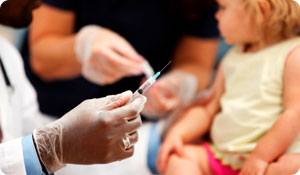
Vaccine safety for children has long been a controversial topic. Whether you're worried about vaccines for childhood illnesses like polio, mumps, measles and chicken pox or those used to combat seasonal flu dangers, there's a lot to think about before your child has his next injection.
You may want to consider that some people are opposed to the idea of vaccinating children against influenza and diseases, fearing that the vaccine can cause serious side effects and even death. Public health officials dispute these concerns, however, and stress the importance of using vaccines to prevent a number of serious communicable illnesses.
Some Risks Exist
The fact is that a small risk does exist with any vaccine today. Keep in mind, however, that the overwhelming majority of side effects caused by vaccines are minor things like redness at the injection site or a slight sore throat or headache. These are easily treatable and resolve quickly. Therefore, the small chance of experiencing these inconveniences are worth it when compared to the bigger risks of not having your child vaccinated and having him get seriously sick instead.
Vaccine Safety Steps
If you're still worried about vaccine safety, though, it may reassure you to know that vaccines are rigorously tested in order to ensure they meet specific guidelines. Vaccine production is also monitored on an ongoing basis to ensure the utmost safety exists. For instance, the US Federal Drug Administration currently licenses all vaccine manufacturing plants and requires each lot of vaccines to be tested for safety.
You should also know that some parents have concerns about the use of a preservative called thimerosal, which contains mercury and is thought by some to be dangerous for children. That's why today, this is no longer used in most vaccines meant for children, with the exceptional of some influenza strains.
Capturing Adverse Affects
You may be aware that a special national reporting system exists today to capture possible adverse effects from vaccines. What you may not know, though, is that many of the instances reported may not actually be caused by the injections but rather be unrelated illnesses that happen to occur around the same time. Since it's difficult to distinguish the cause of certain symptoms, everything reported is considered as possibly related to the vaccine being administered.
Risk of Diseases Spreading
When weighing vaccine safety, keep in mind that the bottom line is that not having your child get his recommended immunizations can put him at great risk for getting seriously sick, and can also pose a danger to the greater population since when people don't get needed vaccines, illnesses that have been controlled for decades suddenly became a problem again. Researchers point to examples from Great Britain, Sweden and Japan, all of which experienced vaccination concerns for a specific disease and had a decrease in compliance as a result. In response to the dropping vaccination rates, the number of illness from those disease cases increased, as did related deaths.
Educate Yourself
If you still don't feel comfortable about vaccine safety for your child, it's important to talk to your pediatrician about your concerns so you can weigh all of the benefits and risks to ensure your child gets the protection he needs to keep him from getting sick.
Sources
Kids Health/From Nemours
http://kidshealth.org/parent/infections/immunizations/vaccine.html
US Centers for Disease Control and Prevention (CDC)





